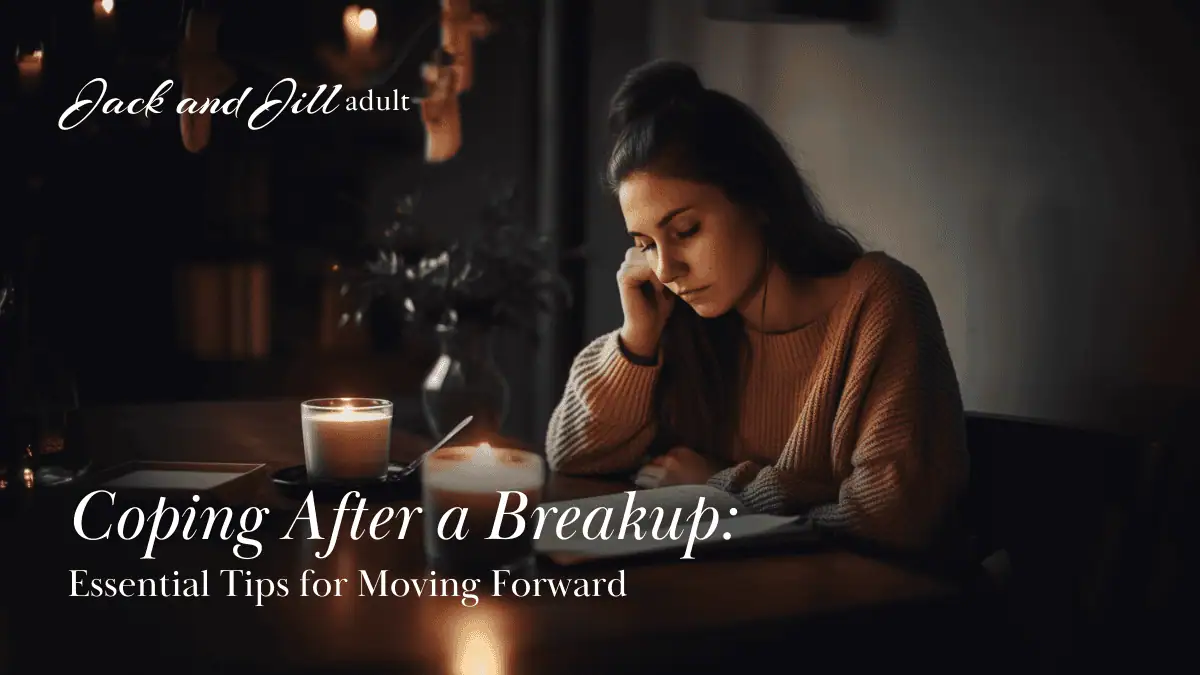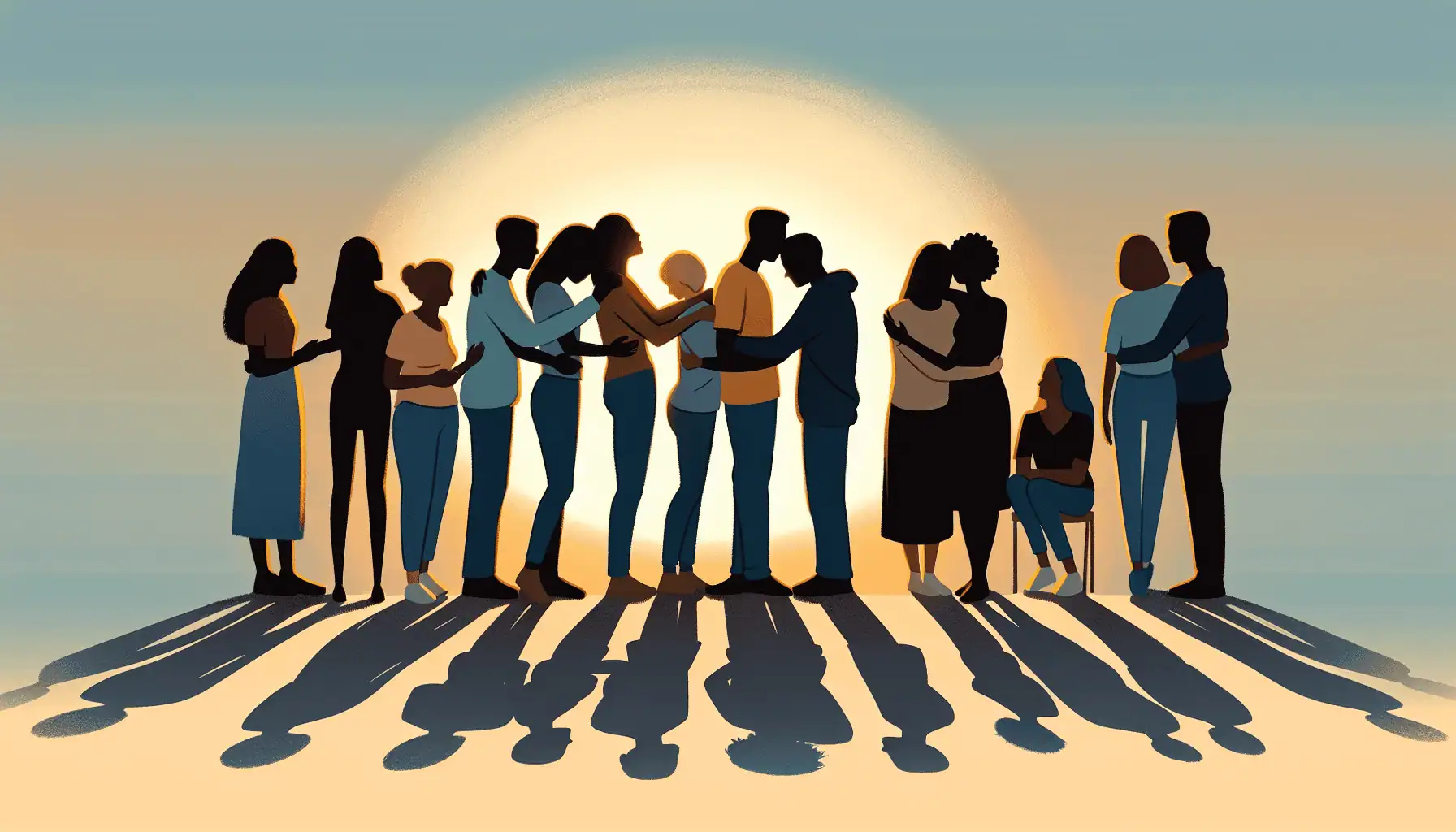
Coping After a Breakup: Essential Tips for Moving Forward
Searching for ‘coping after a breakup’ typically means you’re seeking immediate solace and tangible action steps. Emotions are raw, and the future may look uncertain. Let this article serve as your first step toward clarity and recovery. Discover strategies to process your grief, lean on others for support, and strengthen your resolve to rebuild a positive, independent life post-breakup. Here, we strive to offer insight and a roadmap for navigating the complex healing journey.
Key Takeaways
- Embrace the grieving process and allow yourself to traverse the various stages of grief to find healing and personal growth after a breakup.
- Build a supportive community and establish healthy routines, including self-care practices, to strengthen resilience and pave the way for emotional recovery.
- Use the end of a relationship as an opportunity for self-improvement, learning from past experiences, reclaiming your independence, and preparing for future, healthier relationships.
Embracing the Grieving Process

When a relationship ends, the heartache can be overwhelming. This is the grieving process, a natural reaction to the loss of love. It can involve a dizzying array of emotions, including:
- sadness
- anger
- confusion
- regret
You might also experience physical symptoms like shock and emotional imbalance. But rather than being a sign of weakness, this is your brain adjusting to a new reality.
Instead of avoiding your grief, embracing it is vital to progress. This process involves not only accepting the termination of the relationship but also the associated pain. This acceptance is the stepping stone to healing and reducing the risk of future relationship issues caused by unresolved grief. It also offers personal reflection, reassessing your values, and reconsidering your life goals. Think of your grief as a guide, leading you through the tumultuous waters of heartbreak towards the calm shores of healing and, eventually, healthy pursuit of new relationships.
Allow Yourself to Feel
During breakups, experiencing many conflicting emotions, as well as complicated emotions, is perfectly normal. You may oscillate between negative feelings such as:
- anger
- sadness
- feelings of rejection
- a deep sense of loss
- lowered self-esteem
Don’t forget it is essential to experience these emotions without self-criticism. This is part of the healing process.
Your emotions, as overwhelming as they may be, are a form of self-exploration. They signal that you care deeply, and it’s OK to mourn the end of a significant chapter in your life. Despite the discomfort, this process of self-exploration plays an essential role in healing. So, don’t rush to put on a brave face. Instead, acknowledge your feelings and realize they are a natural part of the grieving process.
It’s not about rushing to ‘get over’ your ex but rather about moving through the pain to arrive at acceptance and, ultimately, healing.
Recognize the Stages of Grief
Understanding the stages of grief can help you navigate your emotional landscape with greater clarity. There are five stages of grief:
- Shock/denial
- Bargaining
- Anger
- Depression
- Acceptance
These stages are a natural part of the grieving process. Each stage introduces distinct challenges and emotions; acknowledging them could be a critical step toward recovery from a breakup.
In the shock/denial stage, you might refuse to acknowledge the breakup, experiencing numbness or disbelief. Then comes bargaining, where you might contemplate what you could have done differently to prevent the breakup. Anger may surface as you grapple with the perceived injustices of the breakup, leading to resentment towards yourself or your former partner.
Depression can manifest as prolonged sadness, withdrawal, or a lack of motivation. Lastly, acceptance emerges as the final stage of grief, where you acknowledge the reality of the breakup and start moving forward with life. It’s important to remember that these stages aren’t linear – they can occur in any order, and it’s expected to cycle back and forth between them.
To cope with each stage of grief, practice self-care, seek support from friends or a professional, and allow yourself time to process the emotions involved.
Building a Support System

Navigating the emotional aftermath of a breakup can be a lonely journey, but you don’t have to do it alone. The construction of a sturdy support system is imperative to evade a sense of isolation throughout the grieving process. This support system can consist of friends, family, and even supportive communities that can provide the emotional relief needed to facilitate your healing.
Developing an emergency contact list of friends and family, including at least one family member, can reinforce emotional resilience and social independence. This list serves as your safety net, helping you resist the urge to contact your ex during moments of weakness. Creating a new daily routine that includes quality time with your support system, such as family members, can provide additional strength and stability during this challenging time.
Identify Your Go-To People
It’s vital within your support system to pinpoint your primary contacts. These individuals need to be aware of the details of the breakup, while others should just be informed that the relationship has ended. This distinction is vital in recognizing the varied roles within your support system and ensuring that each person can provide the type of support you need most.
As you lean on your go-to people, don’t hesitate to communicate your needs. Let them know how they can best support you, whether by acknowledging the breakup decision, lending an empathetic ear, or simply being there to distract you with a movie night or a walk in the park. This is also an opportunity to strengthen connections with these individuals and broaden your social network, which can lead to rediscovering interests and finding additional support.
Joining Supportive Communities
In addition to your go-to people, consider joining supportive communities. These may range from online discussion platforms to local collectives concentrating on recovery from a breakup or emotional stability post-relationship. Being part of a community can alleviate feelings of isolation by connecting you with others who have gone through similar experiences.
When choosing a community, ensure its members are respectful, thoughtful, and aligned with your core beliefs and needs. These communities often offer a range of activities, like workshops, social events, or group discussions, providing both practical support and distraction. Participating in dedicated activities such as group travel or cooperative volunteering can promote new friendships and enrich moving on from a breakup.
Establishing Healthy Routines

A breakup can disrupt your life in many ways, including breaking down the routines that once gave structure to your day. That’s why it’s essential to establish new healthy routines to cope with the changes brought on by the breakup. Whether it’s a morning run or a nightly reading ritual, these routines offer a semblance of normality and authority, soothing your emotions and assisting in your recovery journey.
Creating new healthy routines can also prevent you from dwelling excessively on the past, creating a comforting shield against the pain of loss. This includes maintaining regular online behavior and not drastically altering your social media presence, which can help maintain a sense of normalcy and continuity in life after a breakup. By adopting healthier ways, you can ensure a smoother transition during this challenging time.
The Power of Self-Care
Taking care of oneself is a critical component of recovery from a breakup. It’s about taking time for activities that nurture your body and mind, supporting your mental health during this challenging time. These activities can range from exercising and journaling to practicing yoga or meditation. The goal is to foster a sense of self-worth and instill a sense of purpose and fulfillment independent of a romantic partnership.
Remember, self-care is not about being self-indulgent or avoiding your feelings. It’s about meeting your basic needs and treating yourself with kindness and understanding. Engaging in exercise to release endorphins and obtaining adequate sleep can help reduce suffering and promote healing.
Prioritize Sleep and Nutrition
Just as your mind needs care and attention, so does your body. Upholding a balanced diet and guaranteeing sufficient rest are fundamental to mood stabilization and overall wellness enhancement during the post-breakup phase.
Post-breakup coping should involve healthy habits like sufficient sleep, proper nutrition, and avoiding the use of substances like alcohol or drugs to manage emotions. Prioritizing these aspects of your health can provide the physical support you need to navigate your emotional journey. After all, the mind and body are deeply interconnected, and caring for one often benefits the other.
Redirecting Focus to Personal Growth

While a breakup is undoubtedly painful, it also presents self-improvement opportunities. The adage, ‘every cloud has a silver lining,’ holds even in the aftermath of a relationship’s end, providing an opportunity for personal development. Here are some ways you can redirect your energy towards becoming a stronger, more self-aware individual:
- Cultivate new interests
- Set future-oriented goals
- Focus on self-care and self-love
- Surround yourself with positive influences
- Seek support from friends and family
- Take time to heal and reflect on the lessons learned
Following these steps can turn a break up into a transformative experience.
This transition to singlehood is not about hurrying to replace your ex-partner. Instead, it’s about taking the time to:
- re-evaluate your life
- build a stronger foundation for future relationships
- discover new passions
- establish new routines
Doing these things can enhance your preparedness for future relationships, leading to more meaningful connections in dating relationships.
Discover New Passions
Engaging in new interests and fun activities post-breakup can foster enjoyment of life and personal revitalization. You might find that exploring your environment alone after a breakup leads to discovering new interests or changes in existing ones, fostering personal joy. You might also find fulfillment in rediscovering activities you enjoyed during your youth.
Taking the time to explore new activities or hobbies that were previously set aside due to relationship commitments can be deeply fulfilling. You can also create a prioritized pie chart of personal values, including factors like exercise, hobbies, and career, to guide you in structuring a well-balanced and fulfilling life after a breakup.
Set Goals for the Future
Setting goals for the future is a powerful way to regain a sense of control and direction after a breakup. These goals should be specific and achievable, giving you something to strive towards as you navigate your post-breakup journey.
Scheduling future events and activities post-breakup can provide something to anticipate, facilitating a positive outlook and goal setting. This could involve a solo trip to a new city, enrolling in a cooking class, or setting a fitness goal. The key is to focus on what can be done to make better choices in the future as lessons learned from the breakup. This approach ensures that you are surviving the breakup and using it as a stepping stone towards a happier, healthier future.
Learning from Past Relationships
Each relationship, no matter how it concludes, provides a learning opportunity. An honest reflection on your past relationship can enhance your comprehension of its termination, avoiding similar complications in future relationships. While it might be tempting to blame your ex-partner for everything that went wrong, focusing on your own behaviors and reactions is more beneficial.
Making a list of your ex-partner’s faults can help you keep perspective after a breakup, reminding you why the relationship wouldn’t have worked. Remember, this isn’t about harboring resentment or fostering negativity. It’s about acknowledging the incompatibilities that led to the end of the relationship so you can make healthier choices in the future.
Indeed, painful relationships often provide the most significant opportunities for personal growth and learning.
Assessing What Went Wrong
Acknowledging your role at the end of the relationship can help you set healthier goals for future relationships. Recognizing and building upon past relationship mistakes is essential to learn from them and grow. Establishing clarity about your needs and desires after a breakup is crucial to personal growth.
Discussions with your support team about the private and toxic behaviors in a past relationship can assist in understanding and healing. This isn’t about pointing fingers or dwelling on the past but about gaining insight into your relationship dynamics to build healthier relationships in the future.
When analyzing past behaviors in a relationship, focusing on future improvement is crucial for personal growth. It’s important to remember that it’s not about blaming yourself or your ex-partner but about understanding what went wrong so you can make positive changes.
Learning from past relationships should avoid self-blame to prevent prolonged emotional pain. Instead of dwelling on the past, focus on making better choices moving forward. After all, the end of a relationship isn’t a failure but an opportunity for growth and self-improvement.
Reclaiming Independence

Post-breakup, regaining your autonomy is crucial for progression. It’s about:
- Becoming comfortable with being single
- Learning to appreciate your own company
- Empowering yourself
- Rebuilding your life post-breakup
- Reinforcing your emotional resilience and social independence
Engaging in solo activities, like spending a relaxing evening alone, hiking, or planning a personal getaway, can help you reclaim your independence. These activities allow you to rediscover your individuality outside of a relationship, providing a renewed sense of self and supporting the journey towards reclaiming independence following a breakup.
Solo Activities That Empower
Solo activities can significantly empower you post-breakup. These activities, like journaling, engaging in arts and crafts, and practicing meditation, can provide a pathway to self-discovery and personal empowerment. Physical activities such as walking, hiking, dancing, and learning a new language can enhance confidence and reinforce a sense of independence.
Focus on activities that you inherently enjoy. This could be anything from sports to movies or gaming. These activities shift the focus back onto your needs and personal enjoyment, encouraging a renewed sense of self and supporting your journey towards reclaiming independence to enjoy life.
Building Financial and Emotional Autonomy
Financial autonomy is another important aspect of independence. By separating from shared financial responsibilities, like closing joint bank accounts or dividing shared debts, you can achieve financial independence post-breakup. Creating and maintaining a personal savings account benefits financial independence during and after a relationship.
Understanding and asserting legal rights is a part of financial autonomy, especially for non-married couples who may face a lack of financial protection upon separation. Financial independence isn’t just about having money in the bank; it’s about controlling your financial future and the freedom to make the best decisions.
Navigating Social Media Post-Breakup
In the current digital era, maneuvering through social media after a breakup presents a significant challenge. Unfriending, unfollowing, and potentially blocking your ex on social media can minimize their digital presence and facilitate your healing process. Taking a temporary break from social media by deactivating accounts or muting your ex-partner’s stories and posts can also provide a sense of relief during the post-breakup phase.
It’s also essential to resist the temptation to engage in negative online behaviors like social media stalking or posting derogatory comments about your ex-partner. Remember, maintaining your online reputation and mental health is more important than any fleeting satisfaction these actions might provide.
When to Seek Professional Help
Despite the immense comfort that friends, family, and supportive communities can provide after a breakup, in some instances, professional intervention might be required. If you’re experiencing persistent symptoms of depression or anxiety or having thoughts of self-harm, it’s crucial to seek professional help. Feelings of persistent sadness or worry, low energy, motivation, or lack of joy in previously enjoyed activities are solid indicators for seeking professional support.
Unaddressed grief can lead to unhealthy coping strategies, like substance abuse, which may result in clinical depression and further mental health issues. Therefore, recognizing these signs and understanding the need for professional assistance is crucial during the post-breakup recovery phase. Remember, seeking help is not a sign of weakness but a testament to your strength and commitment to your well-being.
Summary
In conclusion, navigating the aftermath of a breakup is a journey filled with emotional highs and lows. It’s about embracing the grieving process, building a support system, establishing healthy routines, focusing on personal growth, learning from past relationships, reclaiming independence, and seeking professional help. While the path may seem daunting, remember that every step brings you closer to healing and self-discovery. Keep walking, and soon, you’ll find yourself moving forward with renewed strength and resilience.
Frequently Asked Questions
How can I reclaim my independence after a breakup?
After a breakup, you can reclaim your independence by engaging in empowering solo activities and working towards building financial and emotional autonomy. This will help you regain a sense of control and self-reliance.
When should I seek professional help after a breakup?
Seek professional help after a breakup if you’re experiencing persistent symptoms of depression or anxiety or having thoughts of self-harm. Your mental well-being is important; seeking help can significantly improve your recovery.
How can I better handle my emotions after a breakup?
Embrace the grieving process, allow yourself to feel, and recognize the stages of grief. Practice self-care and seek support to cope with your emotions after a breakup. You’re not alone in this.
How can I focus on personal growth after a breakup?
Focus on discovering new passions, setting future goals, and learning from past relationships to grow personally after a breakup. Embrace this as an opportunity to better yourself and move forward.
How do I deal with the urge to check my ex’s social media?
One strategy is to remove or block your ex from your social media accounts. Keeping busy with activities and surrounding yourself with supportive friends can help redirect your focus. If the urge persists, consider a social media detox to break the habit.
Is it normal to feel like I’m not progressing in my healing?
Yes, it’s normal. Healing isn’t linear and can sometimes feel like ups and downs. Be patient with yourself and acknowledge even the small victories in your journey to recovery.
How can I rebuild my self-esteem after a breakup?
Rebuilding self-esteem starts with self-compassion and positive self-talk. Set small, achievable goals to build confidence. Engage in activities that make you feel good about yourself and remind you of your worth and capabilities.

